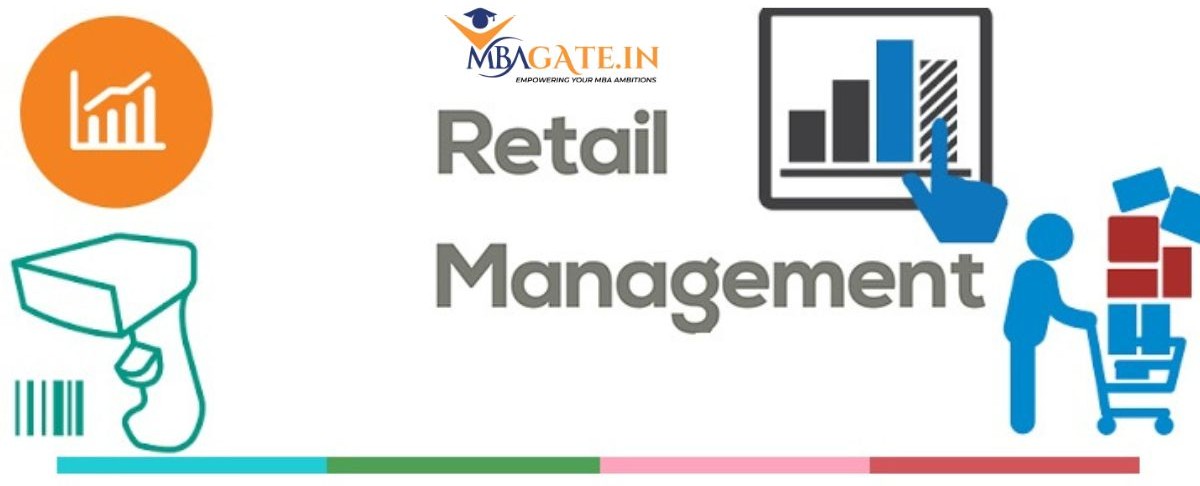BBA in Retail Management
Retail is among the world's fastest-growing industries, especially in countries like India, where there is growing demand for organised retail. With the growth of shopping malls, supermarkets, e-commerce retail platforms and global brands, the need for trained retail professionals has grown tremendously. BBA in Retail Management educates students on how to create, manage and expand retail businesses with a focus on client satisfaction.
Students learn retail operations, supply chain logistics, marketing strategies, store design layout, inventory control, pricing strategies and customer relationship management. They are also taught soft skills such as communication, problem-solving, leadership and decision-making, which are essential for success in the retail sector.
In the present educational framework, a BBA in Retail Management is valued to a large extent, as it caters directly to actual business requirements. The retail sector offers a variety of job opportunities that include store manager, retail buyer, merchandise planner, visual merchandiser, supply chain manager, sales manager and customer service manager. As e-commerce and digital retail are expanding at a fast pace, students are exposed to online business ideas and digital marketing.
The course also fosters entrepreneurship. Those who successfully complete this program are able to open retail stores or franchises of their own. It makes them understand market trends, customers' needs, and selling strategies better. Additionally, the program keeps pace with emerging technology trends like retail analytics, digital payments, artificial intelligence-powered customer support and inventory automation.
The worth of a BBA in Retail Management in the current education system is that it fills the gap between classroom learning and industry demands. It equips the youth to address the growing needs of the retail sector, both online and offline. With lifestyle changes, urbanisation and increased customer expectations, this course educates students to spearhead the retail revolution through innovation, efficiency and customer-driven strategies.

Highlights of BBA in Retail Management
The BBA in Retail Management program teaches students how to manage retail enterprises both offline and online. It addresses critical aspects such as retail operations, marketing, customer service and supply chain management. Internships and industry initiatives provide hands-on learning opportunities for students. Students gain experience in sales, merchandising, inventory management and digital retail. It also qualifies them for rapid career advancement in malls, supermarkets, e-commerce and branded retail enterprises and prospects to launch their retail businesses.
What is a BBA in Retail Management?
The BBA in Retail Management is a three-year undergraduate degree that educates students on how to operate retail businesses. Retailing involves the direct selling of goods or services to customers via shops, malls, supermarkets, or web retailers. The course instructs students on the retail sector and how to effectively manage customers, products and shop operations.
The chief aim of a BBA in Retail Management is to make one competent enough to manage retail stores successfully. It instructs about how to stock and arrange goods, deal with customers and make additional sales. One is also taught how to lay out a store, select the most suitable items, price them and promote goods to get clients. The course comprises offline and online retail, including actual shopfronts and internet-based sites.
It also emphasises customer service because keeping customers content is essential in retail. Students learn how to communicate efficiently, solve client problems and offer a good shopping experience. Aside from that, the course includes marketing, supply chain management, accounting, sales and human resource management.
With the growth of shopping malls, branded outlets and e-commerce sites, the need for professional retail specialists is increasing. This course helps to equip students for the roles of a store manager, sales executive, merchandiser, retail buyer and supply chain officer. It is also useful for individuals interested in opening their own retail business or franchise.
Subjects of BBA in Retail Management
The modules in the BBA in Retail Management program are designed to provide students with a comprehensive understanding of how retail firms operate. These disciplines help students develop the skills required to run stores, interact with customers, manage inventory and operate in both offline and online retail industries.
Benefits of doing a BBA in Retail Management
Students who undertake a BBA in Retail Management can significantly benefit from this course. It is one of the major advantages that it educates job skills. Students learn skills like store management, customer care, inventory handling and improving sales, all of which are highly sought after in the retail sector.
The program also assists in building effective communication and customer service skills. These are crucial because retail careers require everyday interfacing with customers. Marketing, supply chain management and store operations are also learnt by the students, and these enable them to understand how the whole retail sector works.
Another advantage is that it generates a number of work opportunities. Students can become store managers, sales executives, merchandisers, retail buyers or supply chain managers of big companies, malls, supermarkets and e-commerce websites. The retail sector is growing very fast; therefore, there is always a demand for competent individuals.
The BBA in Retail Management course also prepares students for entrepreneurship. Students who want to have their store, boutique or franchise can gain the knowledge to operate a successful retail business. The course will teach you how to acquire customers, select the right products, and control revenues.
The program also makes students aware of emerging trends, including online shopping, payments through digital means and retail technology. This enables them to stay competitive in a constantly changing business environment.
The retail sector also offers quick career progression. Dedicated individuals can easily move on to superior positions like area managers, regional managers and store heads.
Skill Development after BBA in Retail Management
Customer Service Skills
Applicants are taught how to manage client complaints and enquiries and deliver effective solutions. Effective customer service boosts client loyalty and sales.
Communication skills
Good communication is the cornerstone of retail. The course enhances verbal and written communication skills so that applicants can deal with clients, team members and vendors in a professional manner.
Sales and Negotiation Skills
Students are taught how to persuade customers, upsell products and negotiate purchases from suppliers, thereby boosting sales and profitability.
Inventory & Stock Management
The program instructs participants on how to manage inventory, prevent overstocking or stockouts and effectively manage supply chain functions.
BBA in Retail Management: Entrance Exam
Admission to the BBA in Retail Management is primarily based on merit, but some institutions and universities have entrance exams to select candidates. Some institutes may also administer their entrance exams, followed by personal interviews or group talks. The admission exam guarantees that candidates possess the fundamental abilities needed for business studies and the retail industry.
BBA in Retail Management: Eligibility
Students should have cleared their 10+2 or equivalent exam from a recognised board of education, like CBSE, ICSE or state boards. This is the least academic requirement to apply for the course.
The majority of universities need a minimum of 50% marks in Class 12 exams. Certain private schools and universities, based on their entry criteria, could take students with 45% or even less.
The course is available for students from all academic streams. Students who have studied commerce, arts or science are eligible for admission. A background in commerce can be of help in understanding business concepts early on.
Entrance tests, group discussions and personal interviews are some of the selection procedures that certain colleges may follow in order to evaluate candidates' aptitude, communication skills and interest in retail management.
Colleges value people with excellent communication and interpersonal skills in the retail sector, which values client satisfaction. These skills support client interaction, issue solving and collaboration.
A basic familiarity with business, marketing or entrepreneurship, as a result of school subjects, workshops or an interest in the field will be helpful but is not necessary.
Admission Process
Submit the application form online or offline through the official college or university website that conducts the course.
Make sure that applicants fulfil the eligibility conditions, like clearing 10+2 with the desired percentage.
Certain colleges can also conduct entrance tests to determine aptitude, thought processes and English language skills.
Most colleges offer direct admission based on Class 12 marks without an entrance exam.
Chosen candidates can be asked to participate in group discussions or individual interviews to test their communication skills and passion for work in the retail sector.
Provide all the necessary documents, including Class 10 and 12 mark sheets, ID verification, photographs and other certificates.
After selection, applicants have to pay the admission fee to book their seat in the program.
Once all processes are over, the institution will issue an admission confirmation email or letter to the applicants.
BBA in Retail Management: Top Colleges in India
Top universities in India that provide BBA in Retail Management give high-quality education with an emphasis on practical skills and industry experience. These colleges assist students in learning about retail operations, customer service, merchandising and digital retail. They also provide internships and actual projects with prominent retail companies, equipping students for successful careers in both the offline and online retail sectors.
Career Prospects after BBA in Retail Management
Students with a BBA in Retail Management can pursue a variety of careers in the retail industry. They can work as store managers, sales managers, retail executives, marketing managers and operations managers. There are also work chances in e-commerce giants such as Amazon and Flipkart. This course also trains students to start their own retail companies or franchises. The retail industry provides good employment opportunities, with quick promotions based on performance.
Future Scope
Heavy demand in the organised retail industry: With the increased upsurge of organised retail, including malls, supermarket chains, and brand outlets, there is a consistent demand for skilled retail professionals. Graduates can comfortably find employment in leading retail companies handling stores, operations, and sales.
E-commerce opportunities: Web shopping is increasing, opening up the possibility of more jobs at e-commerce sites like Amazon, Flipkart and Myntra. Graduates can find jobs in online store management, customer support, online marketing and product descriptions.
Quick Career Progression: The industry offers quick promotions to diligent staff. From the executive level, it is possible to rise to store manager, area manager or regional head within a couple of years based on performance.
Global Job Opportunities: Walmart, IKEA, Zara and H&M are some of the global retail brands that offer career opportunities everywhere across the globe. There is a high demand for trained retail managers in global markets, offering students chances to further their careers globally.
Entrepreneurial Opportunities: The BBA in Retail Management course equips students to be entrepreneurs. Students are set for entrepreneurship, be it opening a boutique, a grocery store, a franchise, or an online business.
FAQs
After earning a BBA in retail management, a candidate can go on to earn an MBA. The only requirement for pursuing an MBA is that the candidates should have completed graduation with 50% or more marks from a recognised university.
The top recruiters for BBA in Retail Management graduates are Amazon, Apple, Deloitte, Microsoft, Reliance Group, Adani Group, etc.
Candidates for a BBA in Retail Management must have completed class 12 at a recognised school and board with at least 50% of the possible marks. Candidates studying from any stream can pursue this course.
Yes, a candidate can pursue a BBA in Retail Management online. Many universities, like Amity University, Chandigarh University, and IGNOU, provide the online BBA course. Candidates can get a BBA degree through these universities.
Yes, an internship is included in the BBA in Retail Management. Internships provide real-life experience to the candidates regarding their work and education. So, the internship is important for experiencing real-life situations.








